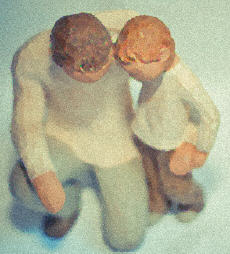__________________________________________
There is a general saying that says, “Everything happened for a reason.” Do you believe or rather do you agree with that saying? Just as a coin has two sides, some of you will agree with that and others will not. There is no ‘right’ or ‘wrong’ in whether you choose to believe in it or not. I believe that ‘Everything happened for a reason.‘ Sometimes we can see the reason immediately after it happened. At times, the reason will only be seen much later and when you see the reason, it’ll be like those aha moments!
For people who believe in a Greater Being above, they will say that they are being put through tests to prepare them for greater things ahead. For me, I see it as opportunities for growth; chances for me to surpass myself to become a better person so that I can be of better service to others around me. My aim is not to ask you to search for the reasons for everything that happened but rather to believe that you too are given unique opportunities to grow.
In so speaking, that will lead to the following statement, “Is there meaning to suffering too?” If we applied the above saying, then suffering happened for a reason too and suffering too provides opportunities for one to grow. In the book Man’s Search For Meaning by Viktor E. Frankl under ‘The Meaning of Suffering’ in page 112, he said, “We must never forget that we may also find meaning in life even when confronted with a hopeless situation, when facing a fate that cannot be changed. For what then matters is to bear witness to the uniquely human potential at its best, which is to transform a personal tragedy into a triumph, to turn one’s predicament into a human achievement. When we are no longer able to change a situation – just think of an incurable disease such as inoperable cancer – we are challenged to change ourselves.”
He went on to cite an example of one of his cases:
Once, an elderly general practitioner consulted me because of his severe depression. He could not overcome the loss of his wife who had died two years before and whom he had loved above all else. Now, how could I help? What should I tell him? Well, I refrained from telling him anything but instead confronted him with the question, “What would have happened, Doctor, if you had died first, and your wife would have had to survive you?” “Oh,” he said, “for her this would have been terrible; how she would have suffered!” Whereupon I replied, “You see. Doctor, such suffering has been spared her, and it was you who have spared her this suffering – to be sure, at the price that now you have to survive and mourn her.” … In some way, suffering ceases to be suffering at the moment it finds a meaning, such as the meaning of sacrifice.”
On a seperate account he shared:
“…when a rabbi from Eastern Europe turned to me and told me his story. He had lost his wife and their six children in the concentration camp of Auschwitz where they were gassed, and now it turned out that his second wife was sterile … the rabbi evaluated his plight as an orthodox Jew in terms of despair that there was no son of his own who would ever say Kaddish (a prayer for death) for him after his death.
I made a last attempt to help him by inquiring whether he did not hope to see his children again in Heaven. However, my question was followed by an outburst of tears, and now the true reason for his despair came to the fore: he explained that his children, since they died as innocent martyrs, were thus found worthy of the highest place in Heaven, but as for himself he could not expect, as an old sinful man, to be assigned the same place. I did not give up but retorted, “Is it not conceivable, Rabbi, that precisely this was the meaning of your surviving your children: that you may be purified through these years of suffering, so that finally you, too, though not innocent like your children, may become worthy of joining them in Heaven?”
Although this is Viktor E. Frankl’s ways or methods in helping his patients find meanings in what they are going through, I do see the underlying opportunities for his patients to grow through their incidences. One does not always have to search for the reasons or meanings for what happened, but to always believe that ‘Everything happened for a reason‘ and always attached with an unique opportunity to grow.
What do you think? Do you believe that ‘Everything happened for a reason’ too? Or do you have your own way to put it? Do feel free to share it with us in the comment.

Photo credit: SnapwireSnaps

 Before that, let us take a look at the picture on the right. The picture shows a bench on the beach under the shades of the tree. It seems that the sun is about to set or it has just risen in the sky. The sea is calm, peaceful and tranquil. Imagine yourself sitting on the bench now, listening to the gentle sound of the waves and the breezes brushing on your face. While you are experiencing that quietness, take deep and slow breaths. Feel every breath you take; feel the air going through your nostrils, through your airways, down your body and eventually into your abdomen. Then you breath out slowly; feeling all the stale air coming out of your mouth in the slow, long breath. You will surely feel peaceful and calm.
Before that, let us take a look at the picture on the right. The picture shows a bench on the beach under the shades of the tree. It seems that the sun is about to set or it has just risen in the sky. The sea is calm, peaceful and tranquil. Imagine yourself sitting on the bench now, listening to the gentle sound of the waves and the breezes brushing on your face. While you are experiencing that quietness, take deep and slow breaths. Feel every breath you take; feel the air going through your nostrils, through your airways, down your body and eventually into your abdomen. Then you breath out slowly; feeling all the stale air coming out of your mouth in the slow, long breath. You will surely feel peaceful and calm. In comparison with the above picture, this picture shown a person sitting on a breakwater and the stormy sea crashing onto the breakwater, threatening to devour the breakwater with the person. The distant sky shown a thunderstorm impending. Now, go through the same exercise as you did above; imagining you are the person sitting on the breakwater. Do you feel the same peace and calmness? It would be a challenge for many to feel the same peacefulness and calmness as compared to the above picture.
In comparison with the above picture, this picture shown a person sitting on a breakwater and the stormy sea crashing onto the breakwater, threatening to devour the breakwater with the person. The distant sky shown a thunderstorm impending. Now, go through the same exercise as you did above; imagining you are the person sitting on the breakwater. Do you feel the same peace and calmness? It would be a challenge for many to feel the same peacefulness and calmness as compared to the above picture. Have you ever been in a situation where you had shown your love and concern to your loved ones and yet made things worse? Or were you accused for not showing them love and concern? I believe once in a while one will get into such a situation. That is where communication is very important. A lot of time, things would have worked out great with a little communication and seeing things from the perspective of the other person.
Have you ever been in a situation where you had shown your love and concern to your loved ones and yet made things worse? Or were you accused for not showing them love and concern? I believe once in a while one will get into such a situation. That is where communication is very important. A lot of time, things would have worked out great with a little communication and seeing things from the perspective of the other person.